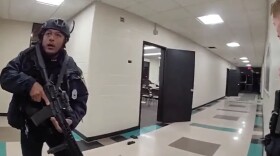A new pilot project in Connecticut aims to give money to people who’ve been injured by violence to help them in their recovery.
In a first-of-its-kind hospital-based pilot project in Connecticut, Yale New Haven Hospital, funded by the nonprofit 4-CT, will pay $1,000 each to 100 victims of violent crimes.
Participants are mostly young men recovering from gunshot wounds.
Pepe Vega, program lead for violence prevention outreach at Yale, is seeing the money already benefit participants, including an 18-year-old who had been shot.
“His mom was a single mom; he was helping out with a little part-time job, now he's out of commission, he can't help,” Vega said. “We came in … after his injury and helped him with $1,000. And he's helped his mom with bills. He was able to put food in the house. It's powerful.”
The 18-year-old wants to join the Army. So Yale connected him to a group that’s working to help make his dream come true, Vega said.
In the U.S., violence is a leading cause of disability and death among teenagers and young adults, according to the Centers for Disease Control and Prevention. Officials with the pilot program note an increase in victims of firearm homicide in Connecticut from 2018 to 2021, particularly among Black and Latino residents.
Dr. Kyle Fischer, policy director at the Health Alliance for Violence Intervention [HAVI], a partner in the project, said in order to fully recover after a violent injury, “patients need several services over a period of time to be able to fully recover physically, psychologically, and socially.”
He said some of the ways patients will use the money is to pay bills, buy food, and get childcare.
The Yale team and HAVI will evaluate the pilot to determine the public health impact of the program.
“We will use this pilot opportunity to share insights nationally, in hopes that many other hospital-based violence intervention programs will gain access to this kind of resource,” Dr. James Dodington, medical director of the YNHH Center for Injury and Violence Prevention, said in a statement.





